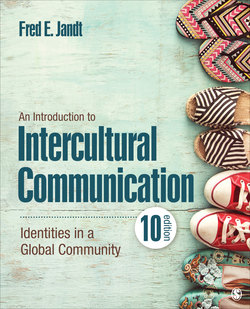Читать книгу An Introduction to Intercultural Communication - Fred E. Jandt - Страница 14
На сайте Литреса книга снята с продажи.
National Identity
ОглавлениеThe nation-state may be the most significant political creation of modern times. For much of humanity from the 18th century on, national identity has superseded religious identity as a primary identity in many parts of the world. It has become common practice today to equate nation-state identity with cultural identity. In most cases, this is largely true. Ladegaard (2007), for example, demonstrated that in a large global corporation employing some 8,500 people in nearly 40 countries, employees perceive their nation-states as the frame of reference or identity while any conceptualization of a global identity is perceived as a hypothetical construction. An individual born and raised in Spain who has worked for years for the Swedish technology company Ericsson at its service center in India most likely self-identifies as Spanish.
Map 1.1 Catalonia, a Semi-Autonomous Region With a Distinct History and Language
National identity is not descriptive when arbitrarily drawn political boundaries do not reflect peoples’ identities. For example, in Europe there are several examples of popular support for secessionist states. In the United Kingdom, a vote for independence for Scotland was held in 2014. In a hotly contested election, nearly 45% voted for independence. While the referendum failed, British prime minister David Cameron pledged reforms granting Scotland greater autonomy. Catalonia is a region of about 7.5 million people in northeastern Spain with its own culture and language. In 2017, 90% of the 2.26 million Catalonians voted in favor of independence. Against Spain’s government’s objections, the region’s parliament has begun the process of separating from Spain. The Spanish government suspended local government and jailed leaders of the independence movement. In Belgium, Dutch-speaking Flemings in the north have pressed for separation from the French- and German-speaking Walloon population in the south.
North and South Korean athletes perform under the Korean Unification Flag as a symbolic break in the tensions between the two countries.
Scott McKiernan/ZUMA Wire/Alamy Live News
Just as religious identity has been the basis for conflict, obviously national identity has been the basis for millions and millions of deaths from conflicts. Cultures provide diverse ways of interpreting the environment and the world as well as relating to other peoples. To recognize that other peoples can see the world differently is one thing. To view their interpretations as less perfect than ours is another.
How differences can lead to conflict can be seen in the evolution of the connotative meaning of the word barbarian from its initial use in the Greek of Herodotus to its meaning in contemporary English (Cole, 1996). To better understand the origins of hostilities between the Greeks and the Persians, Herodotus visited neighboring non-Greek societies to learn their belief systems, arts, and everyday practices. He called these non-Greek societies barbarian, a word in Greek in his time that meant people whose language, religion, ways of life, and customs differed from those of the Greeks. Initially, barbarian meant different from what was Greek.
Later, the Greeks began to use the word barbarian to mean “outlandish, rude, or brutal.” When the word was incorporated into Latin, it came to mean “uncivilized” or “uncultured.”
The Oxford English Dictionary gives the contemporary definition as “a rude, wild, uncivilized person,” but acknowledges the original meaning was “one whose language and customs differ from the speaker’s.” Conflict between nations often begins with the judgment that how others live their lives is in some ways less perfect than how we live our own. In Chapters 6 and 7, you’ll read about the values that come with national identity.
